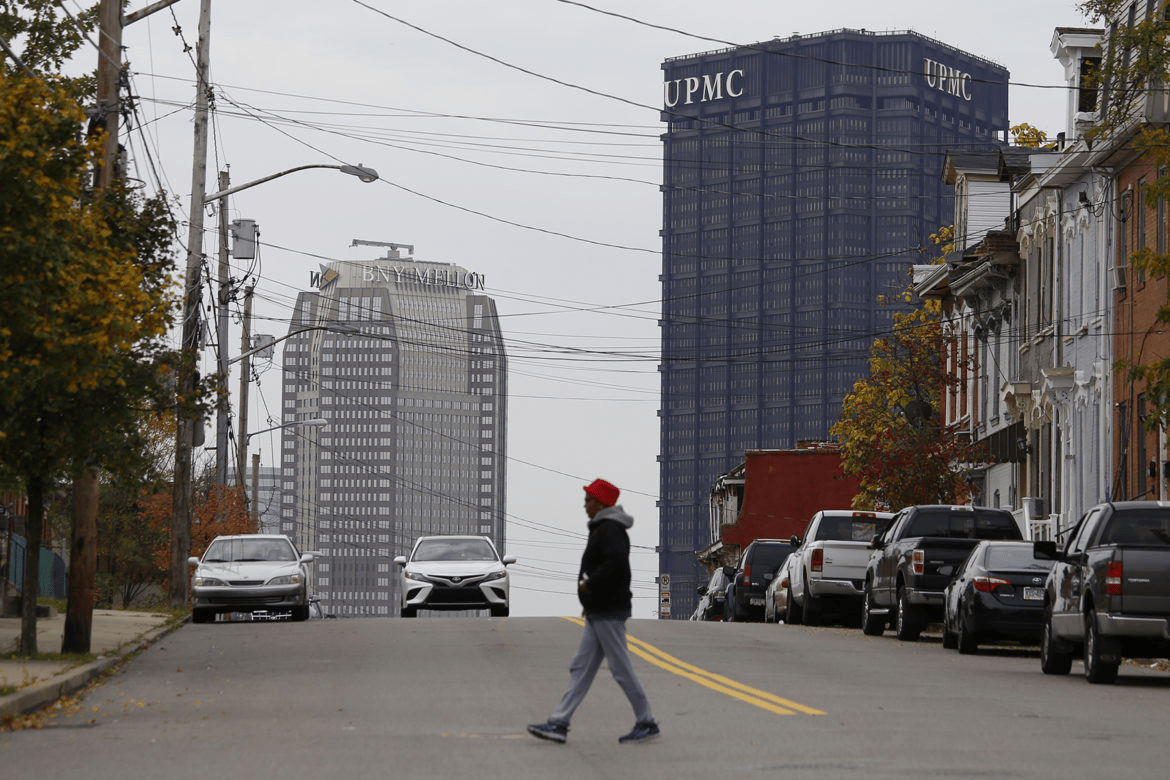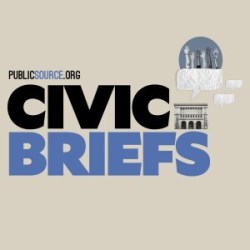As Pittsburgh leaders plot the city’s financial future and prepare for the eventual end of federal stimulus money, analysts at the independent Pittsburgh Budget and Policy Center on Thursday urged officials to consider increasing taxes on wealthier residents and tapping nonprofits such as UPMC.
“There’s a path that Pittsburgh can take towards fair taxation,” said Nthando Thandiwe, one of the researchers, during a Thursday press conference. He said the added revenue could “really address some of the structural inequities in the city, making investments in affordable housing, the creation of good jobs, health and community services that can really transform a city.”
The Budget and Policy Center’s stated mission is to provide “independent, credible analysis” on fiscal policy, with a focus on the impact of policies on working individuals and families.
In a report released Thursday, titled ‘Fair Taxation for Pittsburgh,’ the researchers noted that while the city taxes earned income at 1% for all residents regardless of their income level, the fact that the city does not tax “unearned income” like capital gains means that the wealthy pay a lower share of their overall income than others.

While the Pennsylvania constitution prohibits cities from taxing wealthier individuals at a higher rate, the researchers said that it would be legal to enact a separate tax on passive income sources like capital gains, dividends, interest and rent, which could effectively raise the income tax on the wealthy.
The report lays out proposed tax rates of 3% to 6% on “income from wealth” that would generate between $21 million and $57 million for the city.
The report says that such a tax on income from wealth would draw half its revenue from the top 1% of the population — and more than 75% from the richest fifth of the population.
An infusion from such a tax could help replace a portion of what the city is now receiving from the federal American Rescue Plan Act — a source that will expire after 2024. The city budget was kept afloat last year by that federal infusion, but city leaders will need to find a way to replace it soon.
The other solution put forth by the Budget and Policy Center analysts was to obtain revenue from tax-exempt nonprofits like UPMC. UPMC and other nonprofits such as Highmark and the University of Pittsburgh own large amounts of valuable land in the city, but their nonprofit status exempts them from paying property taxes. If not exempt, the report authors estimated that UPMC would pay roughly $50 million annually in property taxes to the city — money that would more than offset the phase-out of American Rescue Plan funds.
The city, of course, has long wanted to receive more money from the healthcare giant, but has continually failed to do so. Former Mayor Luke Ravenstahl tried suing UPMC to end its tax-exempt status, but his successor, former Mayor Bill Peduto, pulled the lawsuit and tried a gentler approach, coaxing nonprofits to willfully donate to a technically independent nonprofit that would funnel the money to city projects. That initiative stalled when Peduto was voted out of office in 2021.
Mayor Ed Gainey frequently vowed to make UPMC pay their “fair share” on the campaign trail but has yet to announce a plan to do it. Thursday’s report outlines two options — a lawsuit like the one Ravenstahl pursued, and establishing a Payment in Lieu of Taxes (PILOT) program with UPMC.
UPMC already has PILOT agreements with four other Pennsylvania municipalities, the report notes, in which they pay from 40% to 55% of what they would be paying if not exempt from property taxes. In Pittsburgh’s case, that number would land roughly between $20 million and $27.5 million annually.
Gainey’s press secretary Maria Montaño said Thursday that Gainey has been meeting with nonprofit leaders to try to find a “solution” and that he does not yet have a comment on the income tax proposals in the report.
Charlie Wolfson is PublicSource’s local government reporter and a Report for America corps member. He can be reached at charlie@publicsource.org and on Twitter @chwolfson.
Keeping local government accountable to you is our job at PublicSource. Civic Briefs is an ongoing series to share more important news and information with you in real time.







